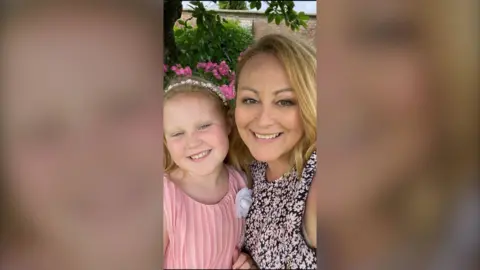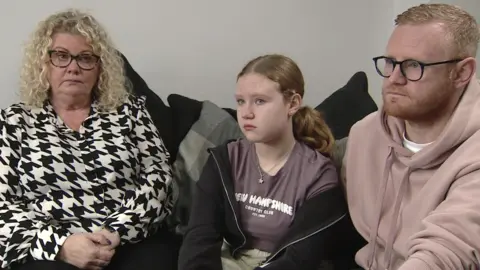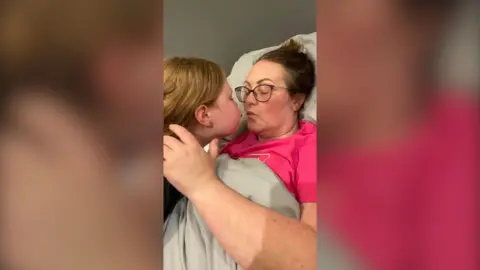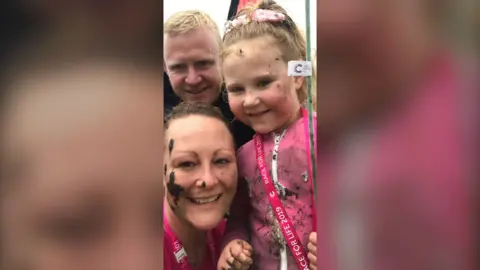CJD: 'By the time it was confirmed it was too late'
 Family handout
Family handout"Suddenly she went from this full-time working mummy to somebody who couldn't walk."
On 20 April last year, 46-year-old Michelle died of Creutzfeldt-Jakob disease (CJD).
She had been diagnosed with the fatal brain-wasting disorder just two months earlier.
Her family have told the BBC they want there to be earlier diagnosis at the onset of symptoms to give other families affected the "gift of time".
 Family handout
Family handoutIn 2022, Michelle was healthy and living with her husband Lee and nine-year-old daughter Connie in Bournemouth and working full-time for the NHS.
"She wasn't always necessarily the life and soul of the party, she was just very thoughtful, her family and friends meant a lot to her," said Lee.
In October that year, she developed a cough and started feeling unwell - by Christmas, she started to deteriorate further.
Lee said: "She started kind of losing her balance, started having tremors, particularly in her hands. Something just wasn't quite right."
He said Michelle was "very tired a lot of the time" and slept for most of Christmas Day.
Her mother-in-law Helen said: "I think that was the biggest surprise, that suddenly she went from this full-time working mummy to somebody who couldn't walk."
Doctors struggled to diagnose her symptoms and only started to close in on the possible cause in February 2023.
"They said it could potentially be CJD," said Lee. "We didn't know what it was at the time, so we did the thing that you'd naturally do, we googled it."
He said Michelle was "petrified, she was so, so scared".

What is CJD?
Creutzfeldt-Jakob disease (CJD), first hit the headlines in 1985, after the first case in cattle was found at a farm in Wiltshire.
Bovine spongiform encephalopathy (BSE), widely referred to as "mad cow disease", was linked to the practice of feeding cows an artificial protein made from the remains of other animals.
By the late 1980s, 4.4 million cattle had been slaughtered.
It became Britain’s biggest ever food scandal, spreading to humans through contaminated beef, with almost 200 people dying from Variant CJD (vCJD).
However, CJD can also be genetic, contracted through contaminated medical products or, as in Michelle's case, for no known reason at all.
Prof Simon Mead, consultant neurologist at University College London Hospitals NHS Foundation Trust, said: "CJD, overall, affects about 130 to 150 people a year now and the vast majority of those people just get it out of the blue and we call that sporadic CJD."
Sporadic CJD is caused when healthy proteins in the human body - prions - become spontaneously misshapen and build up in the brain.
It is a rare and fatal condition that causes rapid brain damage.
"Typically, CJD will result in death within around four to six months," said Prof Mead, who works at the National Prion Clinic in London.
While some people can live more than a year - and a few people more than a couple of years - "typically it's very, very fast", he said.
 Family handout
Family handout'It was so quick'
Describing her mum as "just very kind, very lovable, very loving", Connie said: "It just all happened too quickly. I didn't really know much about it."
"It was so quick," said Lee, adding: "Whether it was her ability to speak, whether it was her ability to eat, her ability to stand up.
"It was heartbreaking because we knew what the outcome was going to be eventually at the end of that and there's no timeframe."
Michelle's mother-in-law Helen said the family rallied round and "did as much as we could".
She said: "When you watch your son and your grand-daughter crumble and you can't take any pain away from them, you can't make it better, you can't just put a plaster on it and go 'it's going to be ok'."
 Family handout
Family handoutThe family want to raise awareness of the condition and Lee competed in the Brighton Marathon in memory of Michelle earlier this year to fundraise for the CJD Support Network charity.
They want earlier diagnosis from doctors, as soon as symptoms start, to give other families time to prepare.
"We wish we'd done things where she could have written some letters, done some voice notes or anything we could have done to create some memories, particularly for Connie," said Lee.
"By the time it was 100% confirmed, it was too late to be able to do some of those things."
You can follow BBC Dorset on Facebook, X (Twitter), or Instagram.
